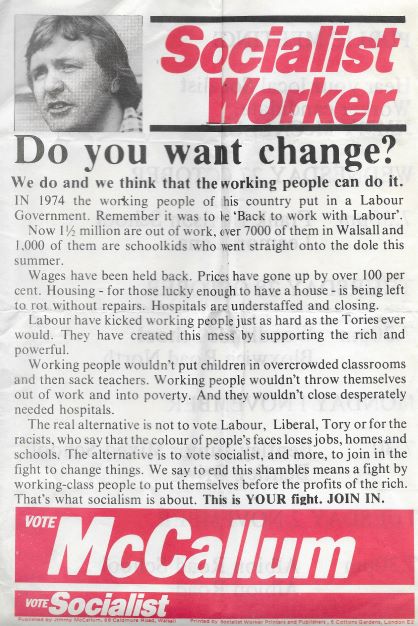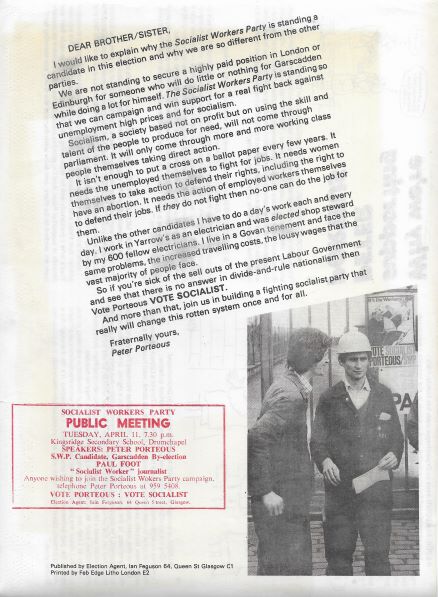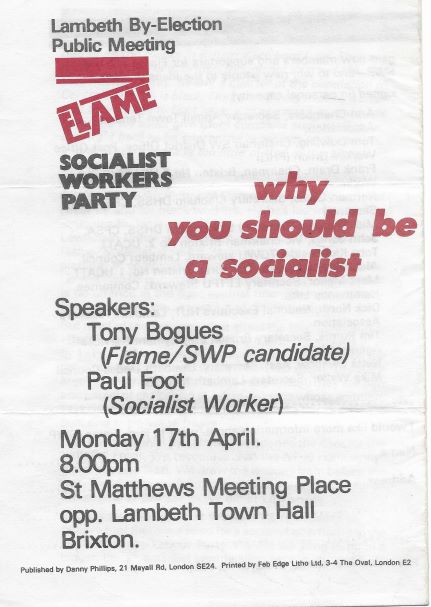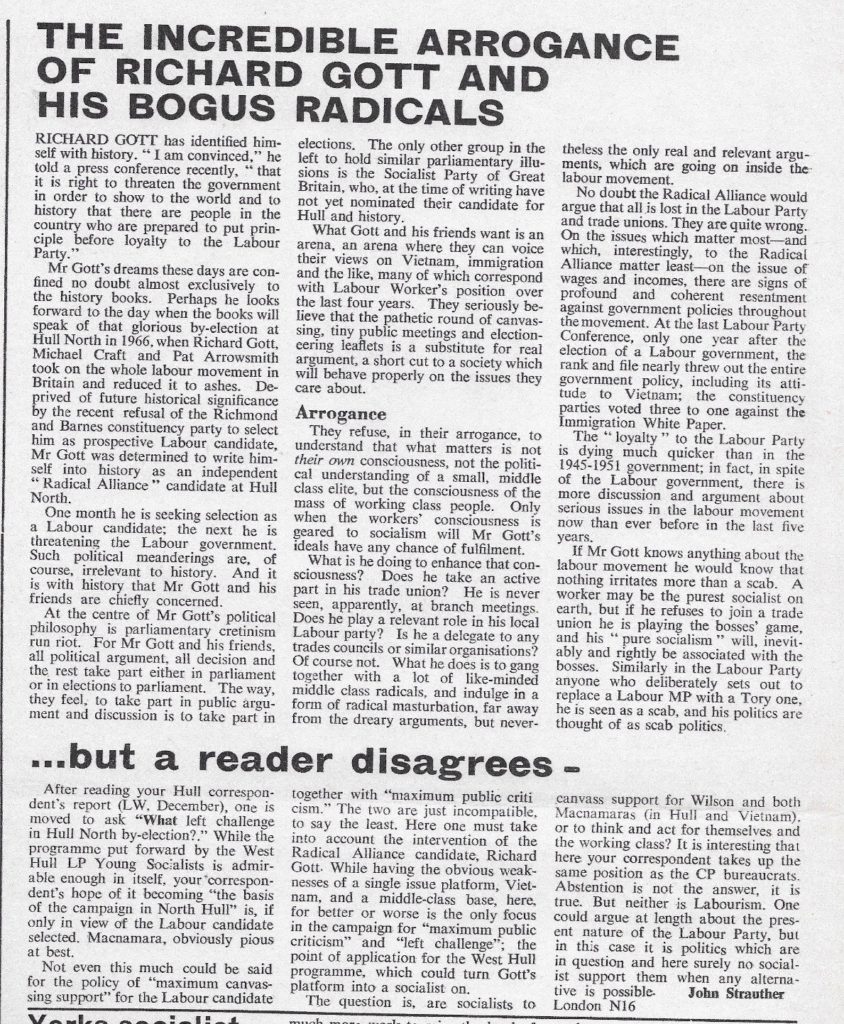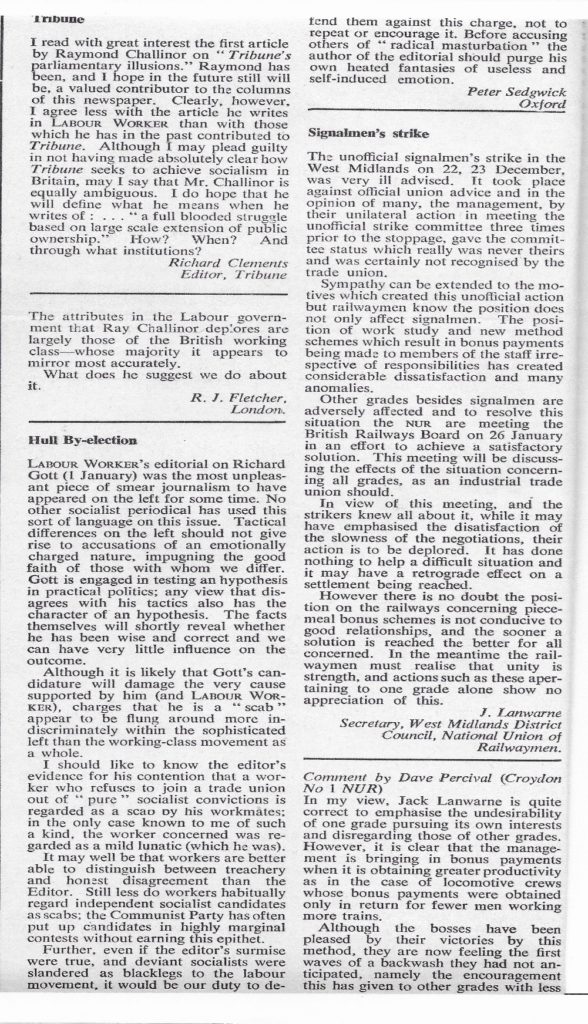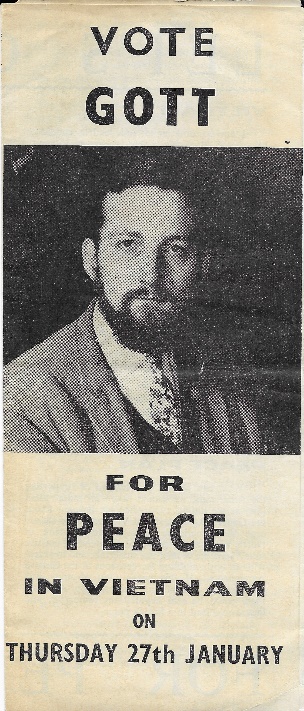Even new members of the SWP today will be aware of its general tradition of calling for a vote for the Labour Party at General Election time. Less of those members will be aware of the fact that up to the late 1960s many members of the organisation were also active members of the Labour Party. Even fewer will be aware that during the period 1959-1970 IS members actually stood for election to Parliament under the banner of the Labour Party. In the third of my articles on aspects of IS and electoral politics I will look at these instances.
The 8 October 1959 General Election
In 1959 the Socialist Review Group (SRG) remained a tiny organisation with much of its activity focused on the Labour Party. The Socialist Review newspaper of October 1959 appeared before the date of the General Election and had this to say about the prospect of a Labour defeat:
“Labour’s defeat can breed only despair in its ranks, greater apathy amongst its supporters. It could lead to mass desertions from rank-and-file activity and even from membership, and could face the weakened socialist movement with the stupendous task of building afresh in extremely unfavourable circumstances.
Criticize we must, and mercilessly, but Labour must win. Every socialist must see it is his imperative duty to help break the Tories and put Labour back in.”
It was in this General Election that SRG member Syd Bidwell, a Trotskyist since 1937 who joined the Socialist Review Group in 1954, stood unsuccessfully for Labour in the safe Tory seat of East Hertfordshire and polled 18,020 votes (32.84 percent). This was the first instance of a current member of the organisation standing for Parliament.
Labour duly suffered its third consecutive defeat with the Tories winning a thumping 100-seat majority. The following issues of Socialist Review contain some interesting articles on the way ahead for Labour, including by Eric Heffer, who had the front-page article in the December 1959 issue. Heffer was, of course, to become an extremely well known Labour MP serving the Liverpool Walton constituency from 1964 until his death in 1991. During the latter part of the 1950s Heffer was often very close to the SRG.
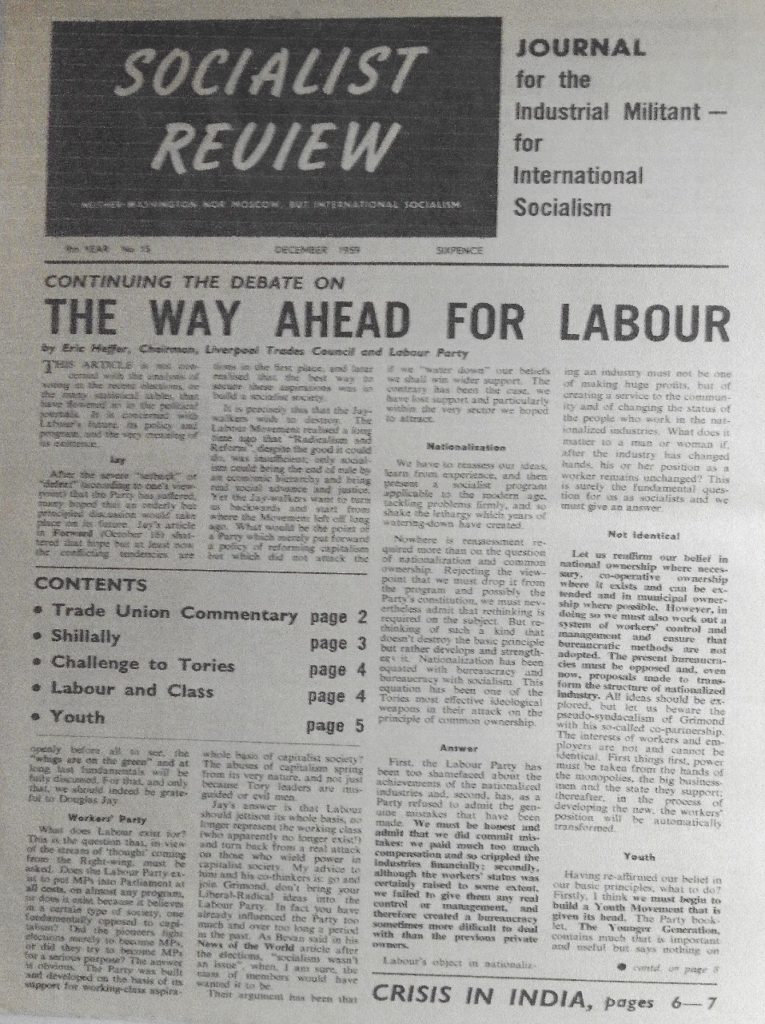
Socialist Review 9th Year No. 15 December 1959
The 15 October 1964 General Election
In 1964, much of the activity of the International Socialists remained focused around the Labour Party, including in its youth organisation the “Young Socialists” where IS organised through the paper Young Guard.
The front page of the September 1964 issue of the Labour Worker newspaper deals with the upcoming General Election of October 1964 under the banner headline “Out With the Tories”. The underlying article says that:
“… the removal of the Tories must be the first of our demands. But it is only the first. Our willingness to give electoral support to Labour must not blind us to the total inadequacy of Labour’s present programme.
Labour under Wilson may introduce social reforms which we cannot fail to welcome; it will not fundamentally challenge the capitalist system which is the root cause of all the social ills we campaign against. In fact, Labour stands for economic measures that will strengthen, not weaken, capitalism. It stands for continued membership of NATO, and for nuclear ‘defence’.
By trying to impose a policy of wage restraint it will be acting directly against the interests of the workers it claims to represent …
… To hide our criticisms of the Labour programme, through fear of ‘rocking the boat’, is to surrender to the Right. But to turn our backs on the Labour Party, the only mass working-class political movement that exists, is to condemn ourselves to ineffectual sectarianism.
Instead we must fight alongside the thousands of workers who in the next few weeks will be on the doorsteps campaigning against Toryism; at the same time we must put forward, clearly and openly, a genuine socialist policy.
A socialist policy for Labour, a policy which could transform the whole system, must be based on the following demands. In foreign policy, we reject nuclear strategy, and call for immediate withdrawal from NATO and all military alliances. The repressive policy being pursued in Aden must be ended. At home, housing, education, health, and social welfare must be given vastly increased priority. The Immigration Act must be repealed. Nationalisation with workers’ control must be central to Labour’s programme. And without workers’ control there must be no wage freeze in any form.
This is not to foster the illusion that such a programme will command support within a few weeks or months … but if we do not begin to campaign for such a policy NOW we will never build a movement that can defeat once and for all Toryism and the system it stands for.”
Prominent IS member John Palmer stood as a candidate for the Labour Party in Croydon North West and received 13,967 votes representing 33.46 percent of the votes cast. Syd Bidwell stood again, this time in South West Hertfordshire, polling 22,237 votes (35.96 percent).
Founding member of the Socialist Review Group Ray Challinor had been the Labour Party prospective parliamentary candidate for Nantwich but he stood down from that position around six months before the General Election.
Harold Wilson’s Labour Party won the election with a tiny majority of four seats. The next issue of Labour Worker in November 1964 explained the outcome thus in its front-page article:
“It could hardly be worse. Labour’s paper-thin majority is sure to drive the leadership farther to the right, and faster than even the most pessimistic feared during the election run up. We warned readers then that the steel frame of Labour’s economic policy was its intent to freeze wages, but we thought it would be hidden behind a useful facade of better pensions, better housing, better health services. Now the facade is more than likely gone.”
It is worth recording that in this General Election two former SRG members were elected to Parliament for the Labour Party. Founding SRG member Trevor Parks won the South-East Derbyshire seat which he held until he stood down at the 1970 election. Very early SRG member Stan Newens won in Epping. He was MP for Epping from 1964 to 1970 and subsequently for Harlow from 1974 to 1983.
The 31 March 1966 General Election
Wilson opted for another General Election in March 1966 and Labour Worker Issue Number 54 (14 March) had this to say:
“The General Election raises issues of the most profound importance for the British working class and labour movement. The Labour government’s appeal for a ‘big working majority’ comes at a time when the trade unions are faced with threats of legislation which would place the clock back more than 50 years; when workers on the shop floor are confronted with long-term wage control and a tougher industrial discipline; and when the forces representing a socialist alternative are – in the main – tied and blinkered by a blind loyalty to the labour leaders.
Labour Worker is convinced that the series of retreats on domestic promises of reforms made by the Labour leaders, the new anti-union policies, and the disastrous support for imperialism abroad, all reflect the growing tensions and crisis within British capitalism. Our starting point in assessing our attitude to the general election is an assessment of the forces of capitalism and the capitalist state acting on the Labour government.”
The article goes on to say that:
“Every Labour candidate should be pressed to give commitments on at least the following four points:
- All out opposition to shackle the unions through new laws
- Total opposition to the leadership’s support for the Americans in Vietnam
- Opposition to the Immigration White Paper and its support of controls
- Full support for workers’ fighting a coercive incomes policy in defence of their living standards”
The article finishes as follows:
“Labour Worker urges socialists everywhere to vote and work for the biggest possible Labour majority …
… A Labour government with a big majority will be held to account for every promise made to the working class. It will be openly opposed and fought on every act taken against the organised working class movement. It will be exposed for its every shameful act of accommodation to nuclear imperialism. Its ‘left wing’ will have its last protecting fig leaf for supine inactivity rudely removed.
Labour Worker will play its part in the struggles ahead under a Labour government. For out of them and out of the education they will bring can and will come the development of a powerful force for socialism.”
Labour duly won the election with a massive 98-seat majority. The headline for the Labour Worker issue after the election (No. 55) proclaims “Wilson’s Victory Means – The End of Fig-Leaf Politics”.
In pursuing the argument that the size of the new Labour majority removes any excuse for Labour based on their need to survive in Parliament the article states:
“At every conceivable level in the Movement the point must be hammered home: that there is no genuine purpose of a Parliamentary Labour Party, elected and supported by working class people, unless it is to enact policies which will benefit their working class supporters and to move towards a society where workers control their own destinies: that unless it does move in that direction, if it moves in precisely the opposite direction and attempts in the name of the workers to establish a super-capitalist state, then the workers will seek an alternative.
The alternative will not be the Tories: it will go to the very roots of the Parliamentary structure, undermine it, and replace it with properly representative organisations. How the Parliamentarians behave over the next few years will decide the fate of Parliament itself.”
In that 1966 General Election IS member Michael Downing stood for the Labour Party in Woking polling 19,210 votes (30.8 percent). The seat was won by the Tory Cranley Onslow.
Possibly of more historical significance is the story of IS member Syd Bidwell who was standing for Labour in his third General Election campaign, this time in the safe Labour seat of Southall. Bidwell won the seat with 19,989 votes (53.5 percent) but his pandering to racism during the campaign led inevitably to his expulsion from IS within weeks of his election. John McIlroy (1998) tells the story so I will not repeat it here. Suffice it to say that:
“Syd Bidwell, who died on 25 May 1997 at the age of 80, was a Trotskyist during four decades. In 1966, he became, momentarily, the first Member of Parliament to be elected whilst a member of a Trotskyist organisation.”1
John Palmer was the Prospective Parliamentary Candidate (PPC) for Labour in Croydon North West but was this time banned by the Labour Party NEC from standing. A front-page article on the subject, “NEC action on left-wing Labour candidates must be opposed” written by Michael Downing appeared in Labour Worker issue number 49.
John Palmer (pers. comms.) explains the story as follows:
“I fought the 1964 election for Labour in Croydon North West but was refused endorsement by the NEC for the 1966 election because, among other things, I had accused Labour ministers of being apologists for US war crimes in Vietnam. The Croydon NW party refused to accept this ruling and was temporarily closed and a candidate was imposed. Stan Mills, a fellow IS member and experienced militant in the National Union of Railwaymen, was a prominent member of the constituency party and was a stalwart in leading the local party opposition to the NEC’s decision. The NEC witch hunt was led by Ray Gunter, a former trade union leader and Labour minister who eventually left Labour and went to run a security firm in South Africa”.
Fellow IS member Constance Lever had been selected to fight the seat in Epsom for Labour and was also banned. Michael Downing covered the situation of both Palmer and Lever in an article “’Democracy’ in Croydon” in Labour Worker number 54 (14 March 1966). He wrote:
“Against every kind of pressure and moral blackmail from Transport House and the Labour Party National Executive, North West Croydon Constituency Labour Party decided to stand by John Palmer as their selected parliamentary candidate. Despite his non-endorsement by the NEC two months ago, and Transport House threats that the seat might either go by default or that a ‘scab’ candidate [be] imposed on the party, the North West GMC reselected Palmer by an overwhelming majority against two other ‘supported’ candidates.
But this show of democracy was too much for the disciplinarians at Transport House. They have again refused to endorse Palmer and have imposed their own candidate on the party …
The NEC still has given no reason for the non-endorsement of either Palmer or Constance Lever at Epsom CLP despite protests from more than 60 constituencies. It has become quite clear, however, that it has been the refusal of the two left wingers to give written undertakings to ‘make no public criticism of any aspect of government policy until after the general election’.
Gunter and co want to tighten the controls over the selection of candidates as part of a drive to tighten control still further over the parliamentary ‘left’. Victory in North West Croydon would have been a major blow to the muzzlers and a big victory for the rank and file”.
The 18 June 1970 General Election
Following the upheavals of 1968 with its growth in the membership of IS and its turn to being a more interventionist and action-orientated organisation work within the Labour Party had declined dramatically.
The upcoming June 1970 General Election was debated at the IS Annual Conference in March of that year. The IS Perspectives Document presented to the conference starts as follows:
“A general election this year or early next year will find the working class confused and disorientated. There is widespread discontent with the Labour Government and more politically advanced workers have little sympathy for the Labour Party. But the absence of a credible left alternative means that discontent cannot be welded into a potent ‘third force’ and a ‘Keep the Tories Out’ campaign by Labour is likely to force the more advanced workers to reluctantly toe the line. Apathy and disillusion among less class-conscious workers will result in abstention or voting for the Tories, though when confronted by the ballot paper they may find Tweedledee Wilson marginally less repulsive than Tweedledum Heath. We must grapple with the situation as it is and not as we would like it to be and must reject the posturings of Left sects who crudely lump together all ‘bourgeois’ parties, ignoring their intricate links with different class forces. There is no alternative to the general approach that the election offers no way out for the workers but nevertheless they should ‘Vote Labour – Without Illusions’, on a class basis. We must pillory the record of the Government in all our propaganda and activities but it will be futile to call for an electoral break with the Labour Party until massive open and political working class disenchantment with it exists.”
This perspective was firmed up in a somewhat different manner in the policy put forward in the editorial in International Socialism Journal No. 42 (February/March 1970) titled “Their Election and Us”. Here the “Vote Labour – Without Illusions” line has been dropped in favour of one that says:
“… [A]lthough our main aim in the election period should be to make propaganda against the policies of the Labour government and to indicate the source of these in reformist theory and practice, it would be a mistake, although not a major one, for the Left to call for a vote ‘against both Tories’ and to urge abstention. This would be to claim that a vote for the overt party of capital and a vote for the shamefaced party of capital are the same, a claim which most militant workers still reject …”
This represented the policy of the IS National Committee majority.
A minority on the IS National Committee saw the above majority policy of a refusal to call for a vote for Labour as in sharp contrast to the IS’s approach to the 1964 and 1966 elections.
Their policy was put forward in a “Polemic” in the International Socialism Journal No. 43 under the name of Roger Protz (although the actual internal IS National Committee minority view document was signed by Andreas Nagliati, Jim Higgins, Roger Protz, Fred Lindop, and John Palmer). The Protz article ends as follows:
“What strategy, then, for the election? Our propaganda must make no concession to Labour. We must return again and again to the argument that Labour’s policies have paved the way for a return of a more right-wing Tory Government (a glaring omission from the editorial [in ISJ No. 42]). Labour cannot solve the working class’s problems and, whichever party is in power, the attacks on their organisations and living standards will continue; both parties will attempt to solve capitalism’s problems at the workers’ expense.
Above all, we must stress that a Labour Government is the price we have to pay for the failure to build a real socialist alternative. Support for our own or other independent socialist candidates can be considered, but if we are to maintain a fruitful dialogue with the potential vanguard of the working class, we must advance the slogan: ‘Keep the Tories out – vote Labour and prepare to fight’”.
At the March 1970 IS Conference itself there were three broad positions on the General Election put forward, the majority and minority NC positions, plus another from York Branch (championed by Peter Sedgwick). This third position was in the form of a motion that said, inter alia:
“Conference affirms that the main focus of the Group’s work during the General Election will lie, not in putting up or supporting candidates, but in the production of propaganda attacking the ‘Tweedledum and Tweedledee’ nature of the choice between the Tories and Labour and exposing the sham of parliamentary politics. Bearing in mind that, for most branches, independent candidatures are out of the question, Conference instructs the NC to make early arrangement for the production and distribution of anti-election propaganda and to decide on the form of action (spoiling ballot papers, burning of polling cards, simple abstention etc) that will be urged during the election.”
In the event Conference voted against the York IS motion and in favour of the ISJ No. 42 Editorial “NC majority” policy. To somewhat muddy the waters Conference also voted in favour (by 74 votes to 72 votes) of the International Socialism Journal No. 43 “minority” NC policy.
A later (undated) “Statement by the Executive Committee” on the election circulated to all IS branches tells us that:
“Socialist Worker – the paper must be our main weapon for hammering the phoney ‘alternatives’ of Labour and the Tories … The eve of poll issue will explain the need to keep the Tories out because of the lack of a real socialist alternative and will also contain a major article on the case for revolutionary socialism …
‘Election’ Manifesto – the EC will write and produce by next week a special Manifesto for wide distribution at factories and meetings. Printed in two colours and written in easy language, the Manifesto will, like the paper, expose the phoney alternatives of the Election, explain Labour’s record, and put the case for revolutionary socialism, with an appeal to join IS. If possible, 100,000 manifestos will be printed.
… Activities – no canvassing for the Labour Party, except in the most exceptional circumstances … No canvassing for the Communist Party – there is no room for a second reformist party …
Labour Election Meetings – these provide us with an opportunity to present our policies. We should not aim to break up meetings but heckle, ask questions, and attempt to politically dominate meetings”.
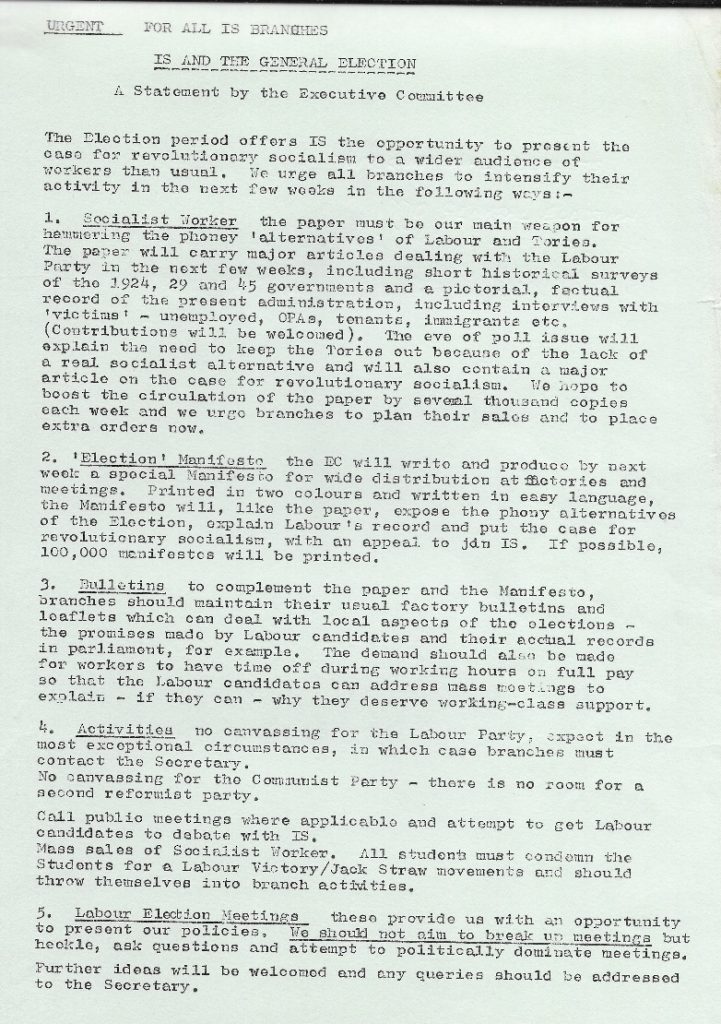
IS Executive Committee Statement to all Branches on the 1970 General Election
The “Election Manifesto” that was produced is, in point of fact, an interesting publication being a 6-page foldout with red type on white paper. Its title is “Labour…Tories. What a Choice!” in a large font with the following text making up the rest of the front page:
“A GENERAL ELECTION – does the prospect bore you? Do you wonder about the promises the parties are making? Can you see less difference than ever between Labour and Tories?
However you vote on 18th June, it won’t give you any real say in the running of the country. Power is supposed to be held by parliament, but real power these days is exercised by a few all-powerful business tycoons and top civil servants. They’re not elected. They’re responsible to no one.
More and more working people are thinking this way – thinking that the election is a meaningless farce.
Most workers will vote Labour because they like the Tories even less. But they remember Labour’s promises in 1964 and 1966 – and they compare the promises with what’s actually happened.”
The inside of the manifesto has sections on “Promises – and Reality”, “The Unfair Society”, “The Undemocratic Society”, “Inequality” and “What we Say”. This last section does say “…we think you should vote Labour…” – but this is caveated somewhat in a final page headed “But No Illusions” which makes the case for revolutionary politics and for joining IS. This page starts with:
“We don’t say ‘VOTE LABOUR’ because we believe in them. We don’t. We believe that the real choice is missing at this election. There is no strong socialist movement in Britain that could really challenge the power of the bosses. That is the tragedy of this election …
And it ends with:
“Yes, vote Labour on 18th June. But do more than put your little cross on a piece of paper. Take a more important decision – to join the fight to build a real socialist movement based on the working class and its struggles. Join the fight to end the power of the profiteers and the merchants of death, and to lay the basis for a world of peace and plenty for all. That’s what we want. Why not get in touch with us, now?
JOIN THE INTERNATIONAL SOCIALISTS”.
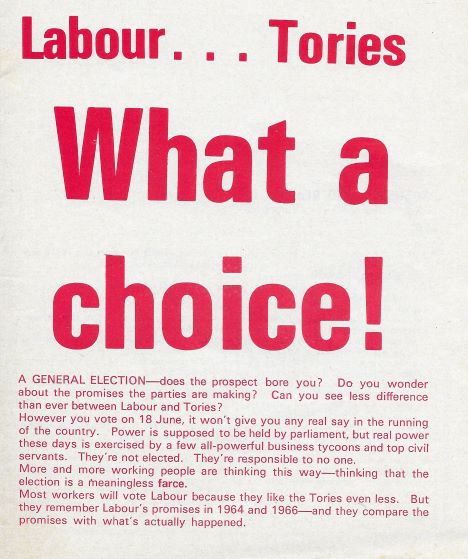
1970 IS “Election Manifesto”
Interestingly, the immediate pre-election issue of Socialist Worker with its headline “Keep the Tories out – Vote Labour and Prepare to Fight!” suggests that the Roger Protz NC Minority line had become IS policy.
Somewhat ironically IS member Jim Murray stood as the Labour candidate in Louth in 1970 against Jeffrey Archer. Ian Birchall tells me (pers. comms.) that:
“Murray was apparently on the Labour Party reserve list and was selected at the last minute to fight this unwinnable seat. He did not ask the party’s permission and the NC was only informed after the election. He claimed to have campaigned on the basis of the four points of the 1968 unity appeal. Certainly he remained a member and was not disciplined. He polled 16,403 votes (33.93 percent) against 25,659 votes for Jeffrey Archer”.
Jim Murray was, in fact, a person of some standing in the north-east labour movement over a number of years. He was convenor of the Vickers plant in Newcastle amongst several positions in the engineering union. In the 1996 book “Faces of Labour: The Inside Story” by Andy McSmith, a former chief press officer for the Labour Party, Murray gets a whole chapter to himself. This is alongside other “faces” such as Neil Kinnock, David Blunkett, Clare Short, Peter Mandelson, John Prescott, Ted Grant, and Tony Blair. In the book McSmith does state that Jim Murray was expelled from IS for standing but the author does not directly name his source for this assertion.
John Charlton was an IS member in Newcastle who knew Jim Murray and advises (pers. comms.):
“Ian has it about right. I can add the fact that Jim was always a semi-detached member of IS. From the mid-seventies, he was pulled into the Hilary Wainwright orbit – alternative plans and so on. There was no formal parting of the ways. Jim was very hard to fall out with, a delightful, amiable raconteur who enjoyed a drink. I suspect Jim never had a bankers-order but paid by cash ‘when the treasurer saw him’. This was not uncommon in the sixties and early seventies. I checked my recollections with Jim Nichol who was IS National Secretary. He is certain Jim Murray was not expelled – though he may have wished to romanticise his parting!”
To underline the general lack of information available, even at the time, the following snippet appears in Vol. 6 Number 7 of Solidarity for Workers Power journal published by Solidarity (North London) on 1 December 1970:
“A pissed-off dicky bird recently whispered to us that one Jim Murray, Convenor of Vickers (Newcastle) and Chairman of the local IS branch, stood as the official Labour Party candidate during the 1970 General Election at Louth (Lincolnshire). Brother Murray apparently stood on a straight Labour Party platform. No action has yet been taken against him by IS locally or nationally. All denials will be acknowledged”.
Murray did also stand for the Labour Party in the February 1974 election, this time in the Nottinghamshire constituency of Carlton. He was again unsuccessful. Whether by 1974 he had left IS voluntarily or been expelled I have no reason to believe he was still a member. In either scenario, it seems that Murray was the last IS member to stand for parliament as a Labour Party candidate.
The Tory 30-seat victory in the 1970 General Election came as a surprise to many.
List of SRG/IS Candidates Standing in UK Parliamentary Elections for the Labour Party
| Date | Candidate | Organisation | Constituency | No. of Votes | Percentage Share |
| 08/10/1959 | Syd Bidwell | Labour Party | East Hertfordshire | 18,020 | 32.84 |
| 15/10/1964 | Syd Bidwell | Labour Party | South West Hertfordshire | 22,237 | 35.96 |
| 15/10/1964 | John Palmer | Labour Party | Croydon North West | 13,967 | 33.46 |
| 31/03/1966 | Syd Bidwell | Labour Party | Southall | 19,989 | 53.50 |
| 31/03/1966 | Michael Downing | Labour Party | Woking | 19,210 | 30.80 |
| 18/06/1970 | Jim Murray | Labour Party | Louth | 16,403 | 33.93 |
Note
This paper is a specially edited extract from my confidential research document:
Rudge, John. 2019. Out for the Count: The SWP and UK Parliamentary Elections, 71pp
References
- McIlroy, John. 1998. Adrift in the Rapids of Racism. Syd Bidwell (1917-1997). Revolutionary History Volume 7 Number 1, pp. 134-165. ↩︎
Were you or someone you know a member of the International Socialists or Socialist Review Group? If so we would like to interview you for our project. Please contact us at contact@is-history.net.

